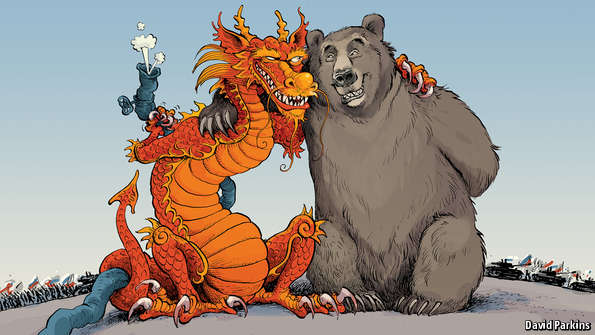
Once rivals, the relationship between these two countries is stronger than ever in history. They share common interests and the rejection of the United States and its allies’ sanctions.
Russia and China have decided to strengthen their alliance in order to face the challenge (and the sanctions) put forward by Joe Biden, who is determined to compete with China for Asian hegemony and directly confront Vladimir Putin, whom Biden referred to as “a killer.”
Last Thursday, during his first press conference since his inauguration, Biden made it clear that, at least in rhetoric, the relationship between the United States and China and Russia will be difficult.
For Biden, Chinese President Xi Jinping “doesn’t have a democratic bone in his body,” that both Xi and Putin believe that “autocracy is the wave of the future” and that democracies cannot work in such a complex world.
Biden believes that the democracies of the world should be working together; he restated his intentions of convening a summit for democracy to face China’s threat to the world order.
On the other hand, Russia and China rejected American pressure and announced that they would be collaborating to counter the illegitimate sanctions applied by the U.S. and its allies against Chinese officials for violations of human rights in Xinjiang. These measures were classified by these countries as destructive Cold War tactics.
“This alliance is not new,” says Patricio Giusto, Director of the Sino-Argentine Observatory. “China and Russia share the highest level of strategic association, which includes mutual defense. It is a very serious bond, and it has been there before Biden’s administration.”
For Andrés Serbin, Russian politics specialist, the Sino-Russian alliance has become stronger with time, although it has not reached the point of being a military alliance. Some classify the alliance as an axis of convenience. Others speak of a Eurasian condominium, tandem or entente.
Sanctions
On Monday, in a premeditated action, the U.S., the European Union, the United Kingdom and Canada announced sanctions against Chinese officials. In the case of the EU, these are the first sanctions since 1989.
In Guilin, Guangxi, China, Ministers of Foreign Affairs Wang Yi and Sergey Lavrov agreed on the unilateral nature of the measures that, according to them, are not based on international law.
“We have noticed the destructive nature of American intentions of undermining the international legal structure centered around the U.N., putting its trust in political and military alliances from the Cold War era and creating new alliances based on the same principles,” said Lavrov in a join press conference. “We reject zero-sum geopolitical games and we reject the illegitimate unilateral sanctions enforced by our Western partners, which seem to be recurring ever more frequently.”
In a joint statement, both countries firmly rejected the use and politicization of human rights issues to interfere in other countries’ internal affairs.
As usual, both China and Russia avoided getting into the nature of the accusations, invoking the principle of non-intervention, claiming that interfering in the internal affairs of independent states with the excuse of promoting democracy is unacceptable.
For Professor Tony Kevin from the Australian National University, the message for Biden is clear: Do not judge us or try to change us; those days are over.
Stages
The ambassadors of both countries urged there to be a summit of the permanent members of the United Nations Security Council, at a time of political turbulence in which the relationship with the West is becoming more and more difficult, to start a direct dialogue to discuss possible ways of solving common problems for the sake of maintaining world stability.
“This is one of the newest aspects of the recent understanding between the two countries, and it is one more step toward the consolidation of an alliance to fight back in the plane of multilateral agreements. The aim is to join forces in the U.N. and other international forums,” explains Giusto.
But the aim is only to resist the sanctions. “There are big shared interests in Central Asia, both military and economic,” adds Giusto. “Part of this strategic convergence relies on the fact that they are complementary economies, albeit asymmetrical, that have managed to weave an institutional structure in Eurasia that excludes the U.S.,” agrees Serbin.
So, both Russia and China are concerned with Biden’s intentions of returning to Asia, implicitly announced by Secretary of State Antony Blinken’s first tour in Asia last week, in which Blinken visited Seoul and Tokyo before a bilateral meeting with a Chinese delegation in Alaska.
“It is a clear message for China, but the situation also concerns Russia, which does not want further American presence in the region,” says Giusto.
Under growing pressure from the U.S., China and Russia became closer in recent years, a situation that was also fostered by the existence of commerce, infrastructure and investment treaties.
All these factors, as well as the sanctions, are bringing Russia and China closer than ever before in history, as stated by Lavrov himself: “The relations between the People’s Republic of China and the Russian Federation are better than ever. Interaction between our two countries is not limited by ideological factors, and it has an intrinsic value that makes it immune to any form of short term consideration.”
“This is something that would appall Henry Kissinger, who, back in the day, thought about becoming closer with China as a way of keeping Russia at bay,” says Giusto. “The two ‘heads of evil’ join forces to face the United States. And, to make things worse, the United States is, relatively speaking, weaker than ever.”

Leave a Reply
You must be logged in to post a comment.